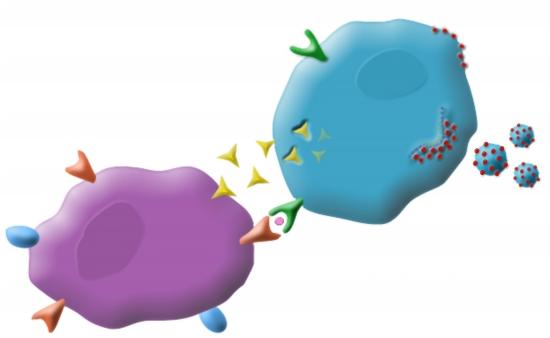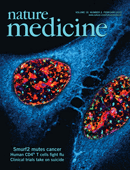导读:在HIV病毒感染者和癌症患者体内,T细胞通常是被抑制的。美国芝加哥洛约拉大学研究人员正在研究一项新技术,该技术主要是把一段DNA递送给免疫系统的指令细胞,指示它们生产一种特殊蛋白质,而这些蛋白质能刺激T细胞,抵抗各种感染甚至癌症。

美国芝加哥洛约拉大学研究人员正在研究一项新技术,经过在免疫妥协性小鼠和感染HIV病毒的人类T细胞中实验,能有效刺激有缺陷的免疫系统,有望将T细胞变成更有效的武器,抵抗各种感染甚至癌症。相关论文发表在最新一期《自然·医学》杂志上。
论文高级作者、芝加哥洛约拉大学斯特里奇医学院肿瘤学院副教授乔斯·格瓦拉-佩蒂诺说,在HIV病毒感染者和癌症患者体内,T细胞通常是被抑制的。该技术主要是把一段DNA递送给免疫系统的指令细胞,指示它们生产一种特殊蛋白质,而这些蛋白质能刺激T细胞。
他们研究的对象是CD8 T细胞和抗原呈递细胞,抗原呈递细胞是CD8 T细胞的指令细胞。CD8 T细胞得到了指令细胞的指示后,还需要获得其他T细胞的援助才能变得强大,去杀死那些感染细胞或癌细胞,并在再次遭遇到病原体或癌细胞时保持警惕。论文领导作者之一安德鲁·兹罗拉解释说,肿瘤有很多潜伏的本事,其中最重要的一项就是遏制T细胞攻击肿瘤。它们能使其他T细胞处于抑制阶段,限制了其对CD8 T细胞的援助。
研究人员用基因枪将一小段DNA递送到皮肤指令细胞内,这段DNA就像一种分子钥匙,能指示指令细胞产生特殊的蛋白质。当CD8 T细胞和指令细胞相互作用时,钥匙会开启CD8 T细胞的潜能,激活它们杀死病原体和癌细胞。通过这种技术,T细胞在杀死病原体和癌细胞时将不再需要其他T细胞的帮助。即使肿瘤把这些起援助作用的T细胞关进了“笼子”,T细胞还是能出动并杀死癌细胞。
研究人员还表示,希望将来能将这一技术用在更多的疾病研究中,包括癌症,预计3年内开始对癌症病人进行临床试验。

NKG2D signaling on CD8+ T cells represses T-bet and rescues CD4-unhelped CD8+ T cell memory recall but not effector responses
Andrew Zloza, Frederick J Kohlhapp, Gretchen E Lyons, Jason M Schenkel, Tamson V Moore, Andrew T Lacek, Jeremy A O'Sullivan, Vineeth Varanasi, Jesse W Williams, Michael C Jagoda, Emily C Bellavance, Amanda L Marzo, Paul G Thomas, Biljana Zafirova, Bojan Polić, Lena Al-Harthi, Anne I Sperling & José A Guevara-Patiño
CD4-unhelped CD8+ T cells are functionally defective T cells primed in the absence of CD4+ T cell help. Given the co-stimulatory role of natural-killer group 2, member D protein (NKG2D) on CD8+ T cells, we investigated its ability to rescue these immunologically impotent cells. We demonstrate that augmented co-stimulation through NKG2D during priming paradoxically rescues memory, but not effector, CD8+ T cell responses. NKG2D-mediated rescue is characterized by reversal of elevated transcription factor T-box expressed in T cells (T-bet) expression and recovery of interleukin-2 and interferon-γ production and cytolytic responses. Rescue is abrogated in CD8+ T cells lacking NKG2D. Augmented co-stimulation through NKG2D confers a high rate of survival to mice lacking CD4+ T cells in a CD4-dependent influenza model and rescues HIV-specific CD8+ T cell responses from CD4-deficient HIV-positive donors. These findings demonstrate that augmented co-stimulation through NKG2D is effective in rescuing CD4-unhelped CD8+ T cells from their pathophysiological fate and may provide therapeutic benefits.
文献链接:https://www.nature.com/nm/journal/vaop/ncurrent/full/nm.2683.html








